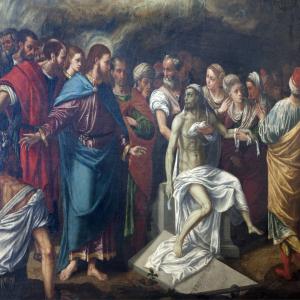The Rev. Dr. Randle R. (Rick) Mixon is pastor of First Baptist Church of Palo Alto, Calif.
Posts By This Author
Not This Time -- A Reflection on the Resurrection of Lazarus
Editor's Note: This post is adapted from a sermon preached by the Rev. Dr. Randle R. (Rick) Nixon.
Some of us have stood at a tomb, faced an open grave, scattered the ashes of one beloved. We know what it’s like to be confronted with the stark reality of death and the flood of conflicting emotions that comes with it. I’ve stood at different sites at Dry Creek Cemetery in Boise, Idaho, and the Veteran’s Cemetery next to it, to bury my father, my brother, my nephew, my step-father and-step sister, my brother-in-law, not to mention my beloved piano teacher, and a dear high school friend. Not so long ago I stood by the open grave of Patrice Heath as her casket was lowered into the ground. We prayed and wept and celebrated her life, but it is not an easy thing, under any circumstances, to lay a loved one to rest.
The ancient story of Lazarus being raised from the dead in John 11:1-45 is just such a situation. It’s also another occasion to encounter Jesus in his divinity and his humanity. It’s a long, complicated story. You have heard it read. I will not attempt to unpack it all.
Taming the Tongue
“Sticks and stones can break my bones, but words can never hurt me.”
How many of us grew up with this old adage ringing in our ears? How many of us believe it’s true?
I’ve gone back and forth over the years. I understand that the saying is an invitation to turn our backs on harsh, mean-spirited words thus robbing them of their power, but how many of us are really capable of simply doing that? The truth is words do hurt and sometimes they do more than hurt. Sometimes they are downright destructive and on a large scale.
I think this is what the writer of James is getting at in this morning’s text. Words, the works of our tongues, can be used for good and evil. It is not always easy for us to shape our words and move our tongues in a fashion that serves our faith, our calling as Christians, our work for the reign of God on earth.
One important spiritual discipline, one vital element to our faith formation, then, is learning to tame the tongue. That is, we are challenged to develop custody of our speech in such a way that good news is proclaimed and people are lifted up toward the fulfillment of their creation in the image and likeness of God. Remember, James is especially concerned that we align our words and our work so we both “talk the walk” and “walk the talk.”
If we are offspring of the heavenly parent, if we are made in the likeness of God, how should that shape our speech and control the way we wag our tongues?
More Than Words
“Words! Words! Words!
I’m so sick of words!
I get words all day through, first from him, now from you. Is that all you blighters can do?”
So, Liza Doolittle challenges the hapless Freddy Eynsford-Hill at the height of a dramatic confrontation in My Fair Lady. Freddy has come to her rescue, with his flowery, long-winded protestations of love, but poor Liza is fed up with words:
“Don't talk of stars, burning above. If you're in love, show me. Tell me not dreams, filled with desire. If you're on fire, show me.”
And you know, Eliza has a point. A well-turned phrase won’t keep you warm at night.
It’s ironic that this drama was penned by one of the great wordsmiths of the English language. The play turns on the transformation of a poor Cockney girl into a proper English lady through the manipulation of her ability to master the English language. One argument put forth in the course of achieving this goal is that it doesn’t matter what you say as long as you say it properly. Style can compensate for the absence of substance.
In contrast, I listened this week to a powerful sermon preached by the Rev. Nadia Bolz-Weber to a gathering of some 34,000 Lutheran youth gathered in assembly in New Orleans.


